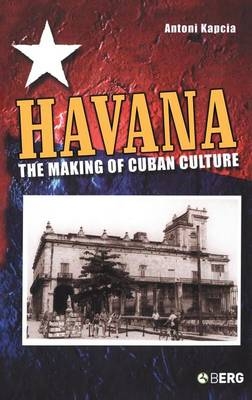
Havana
Berg Publishers (Verlag)
978-1-85973-832-0 (ISBN)
Fat cigars, big cars, dirty money, vibrant music, intellectual ferment. Havana, since its creation in 1535, has long offered a unique, bewildering mix of the backward and the hip, the seedy and the sophisticated. In many respects, it shares the characteristics of other colonial or post-colonial cities of the Caribbean and Latin America. But at the same time, Havana created its own niche both as an international city and a dynamic national capital. Despite Cuba's fluctuating fortunes, Havana has always managed to thrive and develop its own unique character as an urban, social, economic, cultural and political site. Havana offers a sweeping account of the city and its cultural development, focusing especially on the last two centuries and on the role played by the city's cultural communities in the search for national identity. The author introduces us to a marginal city with roots in the sixteenth century, taking us through the periods when it was a sugar boomtown, pulled between empires, a decadent metropolis, a site of both cultural revolution and relative stagnation during the development of the Revolution to its revival in the 1990s.
He looks at the often creative tensions between external influences (especially Spain, France and the United States) and indigenous cultural pressures. Areas covered include architecture, literature, music, dance, cinema and the press. Cosmopolitan playground and nationalist vanguard, Havana has developed its own style while at the same time both reflecting and directing the complicated politics of the whole of Cuba. This book offers a concise introduction to one of the most intriguing cities of the twenty-first century.
Antoni Kapcia is Professor of Latin American History at the University of Nottingham and the author of Cuba: Island of Dreams (Berg Publishers, 2000).
Introduction: The Havana Mosaic: Sweetness and Light * The Colony, 1550s-1902--Part I: The City in the Shadows - Havana before Sugar, 1550s-1760s / Part II: The Boom City: Sugar and the Evolution of a Capital, 1760s-1901 * The Republic, 1902-1958--Part I: A Nation without a Capital, and a Capital without a Nation, 1902-1933 / Part II: Havana as the Cultural Problem, 1934-1958 / Part II: Case study: Bohemia * The Revolution--Part I: The Agony and the Ecstasy of Revolution: A New Marginalisation of Havana, 1959-71? / Part II: The Grey City - Conformity, Stagnation and Brutalism in the 1970s and 1980s / Part III: Case study: Bohemia and Granma * Havana as a Living City, 1990 till the Present--Part I: The Rebirth of a Cultural Space / Part II: Case Study: the Casas de Cultura * Conclusion: Havana as Chiaroscuro
| Erscheint lt. Verlag | 1.7.2005 |
|---|---|
| Zusatzinfo | 20 b&w illustrations, bibliography, index |
| Verlagsort | London |
| Sprache | englisch |
| Maße | 156 x 234 mm |
| Themenwelt | Reisen ► Bildbände ► Nord- / Mittelamerika |
| Sozialwissenschaften | |
| ISBN-10 | 1-85973-832-X / 185973832X |
| ISBN-13 | 978-1-85973-832-0 / 9781859738320 |
| Zustand | Neuware |
| Informationen gemäß Produktsicherheitsverordnung (GPSR) | |
| Haben Sie eine Frage zum Produkt? |
aus dem Bereich


